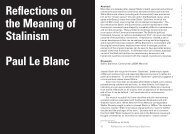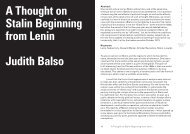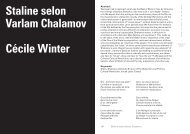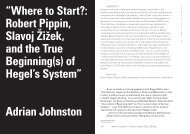Create successful ePaper yourself
Turn your PDF publications into a flip-book with our unique Google optimized e-Paper software.
Of course, this conception of predestined victims who was in first<br />
line the Soviet Union could not be shared. It is interesting to note that<br />
<strong>Stalin</strong> already between February <strong>and</strong> October 1917 called attention to the<br />
fact that Russia tired of the endless war is at risk of transf<strong>or</strong>ming into “a<br />
colony of Engl<strong>and</strong>, America <strong>and</strong> France” 17 : The entente by trying in any way<br />
to realize the continuation of war acted in Russia as if it were in “Central<br />
Africa.” 18 The Bolshevist Revolution was also necessary to stave off<br />
this danger. After October, <strong>Stalin</strong> saw in the Soviet power the pioneer<br />
f<strong>or</strong> “the conversion of Russia from a colony into an independent <strong>and</strong> free<br />
country.” 19<br />
<strong>Hitler</strong> had from the very beginning planned to take up again the<br />
colonial tradition <strong>and</strong> to implement it in Eastern Europe <strong>and</strong> especially<br />
in Russia, ‘savaged’ by the vict<strong>or</strong>y of Bolshevism; on the other side<br />
from the beginning <strong>Stalin</strong> called his country to face the danger of<br />
colonial subjugation <strong>and</strong> interpreted precisely from this point of view the<br />
Bolshevist Revolution.<br />
Even if without any straightf<strong>or</strong>ward idea, <strong>Stalin</strong> began to recognize<br />
the essential characteristics of the millennium that had just commenced.<br />
On the wave of the October Revolution Lenin hoped that the exclusive <strong>or</strong><br />
the main object of the 20 th century will be the battle between capitalism<br />
on the one side <strong>and</strong> socialism / communism on the other: The colonial<br />
w<strong>or</strong>ld was in the meantime completely occupied by the capitalist<br />
powers <strong>and</strong> each new partition followed the initiative of the defeated<br />
<strong>or</strong> ‘disadvantaged’ countries would lead to a new W<strong>or</strong>ld War <strong>and</strong> would<br />
represent a further step in the direction of the definitive destruction<br />
of the capitalist system: The conquest of the new socialist <strong>or</strong>der is<br />
immediately on the <strong>or</strong>der of the day. But <strong>Hitler</strong> made an unexpected move:<br />
He recognized in Eastern Europe <strong>and</strong> especially in Soviet Russia the still<br />
free colonial space which is at the disposal of the German Reich yet to be<br />
erected. Similarly behaved the Japanese empire that invaded China <strong>and</strong><br />
fascist Italy that (with the exception of Ethiopia) aimed at the Balkans <strong>and</strong><br />
Greece. <strong>Stalin</strong> started to realize that the 20 th century would be marked, in<br />
opposition to all expectations, by a clash between colonialism <strong>and</strong> anticolonialism<br />
(supp<strong>or</strong>ted <strong>and</strong> promoted by the communist movement) in<br />
Europe.<br />
In our time it has rightly been emphasized: “<strong>Hitler</strong>’s War f<strong>or</strong><br />
Lebensraum was the greatest colonial war in hist<strong>or</strong>y.” 20 A colonial war<br />
that was first unleashed against Pol<strong>and</strong>. The instructions of the Führer<br />
on the evening bef<strong>or</strong>e the aggression are telling: The “elimination of the<br />
17 <strong>Stalin</strong> 1917.<br />
C<br />
R<br />
I<br />
S<br />
I<br />
S<br />
&<br />
C<br />
R<br />
I<br />
T<br />
I<br />
Q<br />
U<br />
E<br />
/<br />
Volume 3 /<br />
Issue 1<br />
vital f<strong>or</strong>ces” of the Polish people is necessary; “brutal action” is called<br />
f<strong>or</strong>, without being inhibited by “empathy”; “the stronger has the right.”<br />
Similar are the directives that later the project Barbarossa gives: After<br />
its incarceration the political commissioners, the cadres of the Red Army,<br />
of the Soviet State <strong>and</strong> of the Communist Party must be immediately<br />
exterminated; in the East one has to take extreme <strong>and</strong> “tough” measures<br />
<strong>and</strong> the German officers <strong>and</strong> soldiers should overcome their reservations<br />
<strong>and</strong> m<strong>or</strong>al scruples. F<strong>or</strong> leading back peoples of an old culture to the<br />
situation of the redskins (to be expropriated <strong>and</strong> decimated) <strong>and</strong> of the<br />
blacks (to be enslaved) “all representatives of Polish intelligence are to<br />
be killed;” the same treatment is, of course, what the Russian <strong>and</strong> Soviet<br />
intelligence must be subjected to; “this sounds harsh, but this is the law<br />
of life.” 21 This is how one can explain the fate of the catholic clergy, of the<br />
communist cadres in the USSR <strong>and</strong> in both situations of the Jews, which<br />
were well represented in the intellectual layers <strong>and</strong> were suspicious of<br />
inspiring <strong>and</strong> supp<strong>or</strong>ting Bolshevism. <strong>Hitler</strong> succeeded to play out Pol<strong>and</strong><br />
against the Soviet Union, but he f<strong>or</strong>esaw the same fate f<strong>or</strong> both; even if<br />
on a windy <strong>and</strong> tragic path the war of national resistance of the Polish<br />
people <strong>and</strong> the great patriotic battle are finally related to one another.<br />
The turning point of the “greatest colonial war in hist<strong>or</strong>y” is <strong>Stalin</strong>grad. If<br />
<strong>Hitler</strong> was the proponent of the colonial counter-revolution, <strong>Stalin</strong> was the<br />
proponent of anti-colonial revolution that in a completely unexpected way<br />
found its center in Europe.<br />
3. <strong>Stalin</strong>, <strong>Hitler</strong> <strong>and</strong> the National Min<strong>or</strong>ities<br />
Does the definition of <strong>Stalin</strong> that I have just presented st<strong>and</strong> in<br />
contrast to the politics that he had pursued concerning the national<br />
min<strong>or</strong>ities in the Soviet Union? It is beyond any doubt that there is no<br />
space f<strong>or</strong> the right of recession in <strong>Stalin</strong>’s conception. As is confirmed<br />
by the conversation with Dimitrov on the 7 th November of 1937: “Anyone<br />
that launches an attack on the socialist state with his deeds <strong>or</strong> thoughts<br />
will be annihilated without mercy.” 22 Even thoughts are punished: This<br />
is an extra<strong>or</strong>dinarily effective but completely involuntary definition of<br />
totalitarianism!<br />
On the other side, <strong>Stalin</strong> welcomes <strong>and</strong> supp<strong>or</strong>ts the cultural<br />
rebirth of the national min<strong>or</strong>ities of Eastern Europe that have been<br />
suppressed f<strong>or</strong> so long. Telling are the observations that he made on<br />
the X. party congress of the Russian Communist Party in 1921: “About<br />
fifty years ago all Hungarian towns b<strong>or</strong>e a German character; now they<br />
have become Magyarised”; also the “Byel<strong>or</strong>ussians” experience an<br />
“awakening.” This is a phenomenon that is supposed to capture the whole<br />
C<br />
R<br />
I<br />
S<br />
I<br />
S<br />
&<br />
C<br />
R<br />
I<br />
T<br />
I<br />
Q<br />
U<br />
E<br />
/<br />
Volume 3 /<br />
Issue 1<br />
18 <strong>Stalin</strong> 1917a.<br />
19 <strong>Stalin</strong> 1920.<br />
21 <strong>Hitler</strong> 1965, see the speeches from the 22th of August 1939, from the 28th of September 1940<br />
<strong>and</strong> from the 30the March <strong>and</strong> 8th November 1941.<br />
20 Olusoga, Erichsen 2011, p. 327.<br />
22 Dimitroff 2000, p. 162.<br />
38 <strong>Stalin</strong> <strong>and</strong> <strong>Hitler</strong>: <strong>Twin</strong> <strong>Brothers</strong> <strong>or</strong> M<strong>or</strong>tal <strong>Enemies</strong>?<br />
39<br />
<strong>Stalin</strong> <strong>and</strong> <strong>Hitler</strong>: <strong>Twin</strong> <strong>Brothers</strong> <strong>or</strong> M<strong>or</strong>tal <strong>Enemies</strong>?






